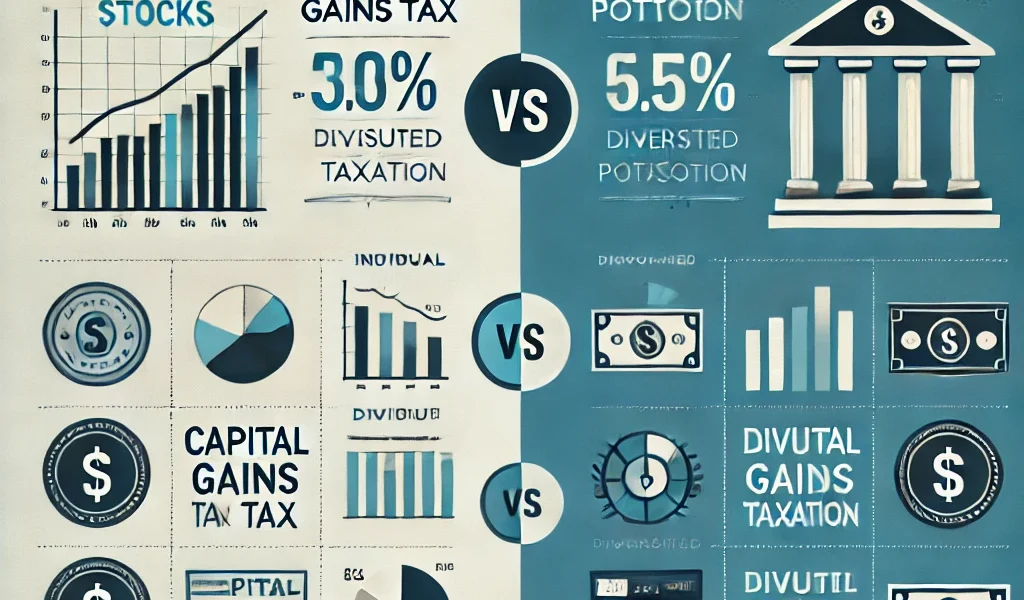Investing in stocks and mutual funds can be an excellent way to grow wealth over time, but understanding the tax implications of these investment choices is crucial for maximizing returns and minimizing tax liabilities. In this guide, we will explore the key tax considerations, benefits, and strategies to help you make an informed decision when investing in stocks or mutual funds.
Understanding Taxation on Stocks
1. Capital Gains Tax on Stocks
When you sell stocks at a profit, the gain is subject to capital gains tax. There are two types of capital gains:
- Short-Term Capital Gains (STCG): If you sell a stock within one year of purchase, the gain is considered short-term and taxed at your ordinary income tax rate.
- Long-Term Capital Gains (LTCG): If you hold a stock for more than a year before selling, the gain qualifies as long-term and is taxed at a lower rate (0%, 15%, or 20% depending on your income bracket).
2. Dividend Taxation
Stocks may pay dividends, which can be taxed as:
- Qualified Dividends: Taxed at the lower long-term capital gains tax rates.
- Ordinary Dividends: Taxed at regular income tax rates.
3. Wash Sale Rule
If you sell a stock at a loss and repurchase the same or a substantially identical stock within 30 days, the IRS disallows the loss for tax purposes.
Understanding Taxation on Mutual Funds
Mutual funds are taxed differently because they pool money from multiple investors and generate gains through stock or bond investments.
1. Capital Gains Tax on Mutual Funds
- When You Sell Mutual Fund Shares: The taxation follows the same rules as stocks (STCG or LTCG based on holding period).
- Capital Gains Distributions: Mutual funds distribute realized capital gains to investors, which are taxable even if you reinvest them.
2. Dividend Taxation in Mutual Funds
- Mutual funds may distribute ordinary dividends (taxed at income tax rates) and qualified dividends (taxed at lower LTCG rates).
3. Expense Ratios and Tax Efficiency
Actively managed funds tend to have higher expense ratios and may generate frequent taxable events, whereas index funds and ETFs are often more tax-efficient.
Key Differences Between Stocks and Mutual Funds Taxation
| Feature | Stocks | Mutual Funds |
|---|---|---|
| Capital Gains Tax | Only when you sell shares | Even if you don’t sell shares (due to distributions) |
| Dividend Taxation | Qualified or ordinary | Qualified or ordinary (depends on fund) |
| Control Over Taxes | Investor decides when to sell | Fund manager’s decisions can create taxable events |
| Tax-Efficient Options | Holding for long-term, tax-loss harvesting | Index funds, ETFs |
Strategies to Minimize Taxes on Stocks and Mutual Funds
1. Hold Investments for More Than a Year
To benefit from lower long-term capital gains tax rates, hold your investments for more than a year before selling.
2. Utilize Tax-Advantaged Accounts
Consider investing in stocks or mutual funds through retirement accounts like IRAs or 401(k)s, where gains and dividends can grow tax-free or tax-deferred.
3. Tax-Loss Harvesting
If you have capital losses, use them to offset capital gains and reduce your tax liability.
4. Opt for Tax-Efficient Mutual Funds
Passive index funds and ETFs generally generate fewer taxable events compared to actively managed funds.
5. Reinvesting Dividends in Tax-Advantaged Accounts
Instead of reinvesting mutual fund dividends in a taxable account, consider doing so in an IRA or 401(k) to avoid immediate tax liabilities.
Conclusion
Both stocks and mutual funds have unique tax implications that investors must consider. If you prefer more control over tax planning, individual stocks might be a better choice. If you prefer diversification and professional management, mutual funds can be a strong option. Understanding how each investment is taxed can help you optimize your portfolio and minimize tax burdens while growing your wealth.
By utilizing tax-efficient strategies and making informed investment choices, you can ensure that your investments work to your financial advantage while staying compliant with tax regulations.




